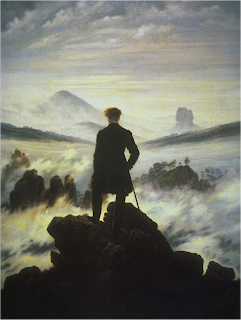The painting shown above is titled Wanderer Above the Sea of Mist. It was created by Caspar David Friedrich in 1818, during the Romantic period. In my opinion, this painting greatly expresses many of the popular ideals from the Romantic period. The first ideal comes from the fact that this man is this man, the wanderer, is completely alone in this vast landscape. As we talked about in class, many paintings from the Romantic era depict humans alongside nature. The inclusion of natural landscapes (as opposed to industrial landscapes) is used to express the Romantic ideal of straying away from society. Unlike artwork from the enlightenment, which often showed people of specific class status in cities and towns, romantic artwork would often represent humans as an abstract object, simply part of nature. This painting differs from some of the other artwork we looked at in class, as the human in this case is actually meant to be the center focus. Other artwork would show humans in the corner of a vast landscape, barely noticeable. Although the human is not represented as that insignificant in this painting, he is still shown as puny in comparison to nature.
The fact that this painting has one solitary person, right in the middle, expresses another Romantic ideal. The subject is portrayed in a heroic manner, seemingly conquering the land. Heroes were a big part of the romantic period, as society began to greatly admire individuals, such as Beethoven and other artists of the time. Furthermore, the "hero"'s positioning represents another romantic ideal. We can only see him from behind, as he is staring out, contemplating. This is similar to a painting we examined in class, where the man was leaning over a railing, staring out. The idea of dreaming and abstract forward-thinking was definitely a big part of the Romantic period, and is further expressed by our hero staring out over the endless landscape, in deep contemplation.

No comments:
Post a Comment